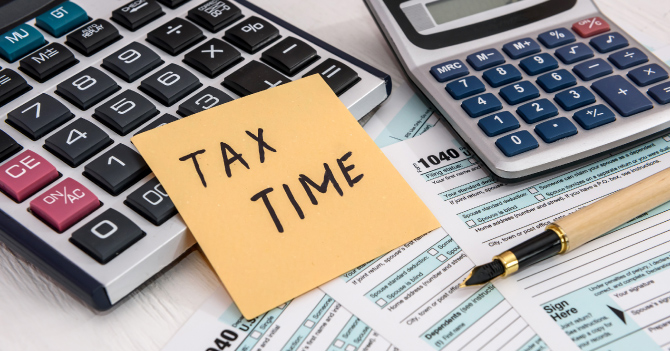
It’s tax season, and as if getting your taxes filed on time wasn’t enough to worry about, that means it’s also tax scam season. With sensitive documents and personal information getting passed around, it’s vital that you stay vigilant in protecting yourself. Whether you’re filing your taxes yourself, hiring a professional, or using a tax preparation software, follow these tax security tips to help you stay safe and secure this time of year.
File Your Taxes Early
Let’s start with a simple tip. One of the ways scammers will try to commit fraud during tax season is by filing a fake tax return using your personal information that they’ve stolen. Thieves don’t even need tax documents – your name, Social Security Number, and date of birth is enough. By the time you go to file your taxes and are told by the IRS that a return has already been submitted in your name, the scammer already has the phony tax return funds deposited in their account. One of the easiest ways to protect yourself is getting your taxes done early - by filing early, you reduce the window of opportunity for scammers to file a fake return using your info.
Keep Your Social Security Number (SSN) Safe
As mentioned above, your SSN is a valuable piece of personal information for identity thieves. To keep it safe, avoid carrying your Social Security card with you and never unnecessarily share your SSN. When filling out tax forms, double-check your SSN to ensure it’s accurate. If you suspect your SSN has been compromised, contact the Social Security Administration as soon as possible! Additionally, if you receive a notice from the IRS suggesting that someone else has already filed a return using your SSN, contact the IRS and follow their instructions to resolve the issue.
Use Strong, Unique Passwords When Filing Taxes
This tip applies year-round to all of your accounts, but it’s especially important during tax time. Your online tax accounts contain sensitive information, so it’s important to use strong passwords that are difficult to guess. It’s also essential to use different passwords for each account. This way, if one account is compromised, your other accounts won’t also be at risk. Don’t fall into the trap of using the same, simple password over and over again because it’s easy to remember – it could also be easy for scammers to figure out. For an additional layer of security, it’s a good idea to enable two-factor authentication (also called multifactor authentication) whenever possible. Push authentication or an authenticator app are generally considered to be more secure forms of authentication.
Be Wary of Phone Scams
Phone scams are a common tactic used by scammers to trick people into revealing their personal and financial data. These scammers often pose as IRS agents and threaten legal action if you don’t pay an alleged tax debt immediately. Thieves today have access to some sophisticated technology, so even if the caller ID makes it seem like a legitimate call from the IRS, it could still be a scam. They may even give you a fake badge number or have your stolen SSN handy to convince you. If you receive a suspicious call, hang up immediately and call back using one of the official IRS phone numbers to report it to the IRS.
Secure Your Mailbox
Identity thieves do more than just plunder your digital information. They also look for sensitive information in mailboxes. There are two easy ways to prevent your information being stolen this way: the scammer can’t get into your mailbox and there’s nothing in your mailbox. Make sure your mailbox is secure and is emptied daily to ensure any mailed information is safe. For the best security, consider using a locked mailbox or a P.O. box for protecting your mail.
Use Secure Wi-Fi Networks
When filing your taxes online, be sure to use a secure Wi-Fi network to prevent hackers from intercepting your information. Public Wi-Fi networks and networks that are not secured by a password can be easily compromised by criminals and are best avoided in general. This is even more true when it comes to filing taxes. Use a secure, password-protected Wi-Fi network you trust so that your sensitive personal and financial information does not get stolen.
Beware of Tax Scams
Scammers love tax season, when there’s huge amounts of personal and financial information available and ample opportunity to trick people into revealing it. Be wary of any unsolicited emails, phone calls, or text messages claiming to be from the IRS or other tax entities. Also, be skeptical of any promises of big refunds or threats of legal action. If it sounds too good to be true, or unbelievably urgent, it probably is.
Tax season is one of the times of the year when scammers and hackers are at their most active. The vast majority of people have personal information and financial documents being sent and received, and that provides these criminals a great opportunity. Be diligent in protecting your personal and financial information, be on the lookout for scams, and if you receive any suspicious contact from someone claiming to be from the IRS, hang up and call them directly.


Comments